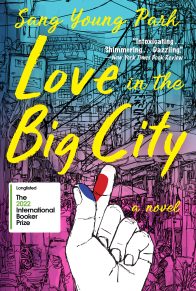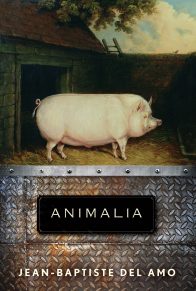Praise for The Son of Man:
Finalist for the Cercador Prize
Winner of the Prix du Roman Fnac
Longlisted for the Prix Femina
“A striking aspect of this macabre, mythlike story is its linguistic extravagance.”—Sam Sacks, Wall Street Journal
“We are in rural gothic horror/thriller territory, but the novel is lifted above its genre by Del Amo’s literary artfulness . . . Del Amo’s is not the typical language of fiction . . . Undeniably, powerfully evocative. Del Amo is a writer like no other.”—Times (UK)
“Even the most faithfully translated books can lack a vital spark of the original. But in Frank Wynne’s translation of an exquisite 2021 novel by French wunderkind Jean-Baptiste Del Amo, the story—an atmospheric exploration of filial relationships—loses none of its taut beauty.”—James Tarmy, Bloomberg
“An opening scene of a group of ancient hunters switches, in a 2001: A Space Odyssey-style jump cut, to a present-day French family—father, mother, son—on a journey. ‘Are we there yet?’ They’re heading to the father’s old house in the mountains of Les Roches to spend the summer. But this is no holiday: through flashbacks we begin to get the full, ugly picture, all told in visceral, physical prose . . . The novel explores how unknowable the motives of adults are to children, and how man hands on misery to man. There aren’t many laughs on the way to the inevitable, satisfying conclusion, but it isn’t half gripping.”—John Self, The Guardian
“A gnawing sense of dread develops through the closely drawn portrayal of family violence and psychological responses to it, escalating into a hostage situation as the man’s controlling behaviour worsens. It’s a devastating, provocative black parable, told with irresistible force.”—Sydney Morning Herald
“Dark, uncompromising, and poetic . . . Del Amo has crafted a work imbued less with a sense of dread, and more with a sense of inevitability . . . Both an excoriation of toxic masculinity, and a plea for understanding . . . Powerful, moving, and thought-provoking.”—GLAM Adelaide
“A brooding, brutal pastoral . . . Inexorable, bleak, and ugly, but it’s hard to look away.”—NZ Herald Listener
“Del Amo follows up his memorable Animalia with another arresting French rural gothic . . . Del Amo’s signature florid style comes to life in Wynne’s consummate translation, and at the heart of the lurid plot is a sensitive depiction of a boy’s confusion. Once this gets its hooks in readers, it won’t let go.”—Publishers Weekly
“Serene descriptions of the surrounding forest and its dazzling plant and animal life contrasts with unflinching descriptions of gunshot wounds and the father’s brutal behavior. The result is an intense French gothic drama that one knows from the outset cannot end happily.”—Booklist
“The Son of Man is a complete vision: a parable as palpable as the flesh Del Amo renders in painstaking detail. Dread and horror and beauty all at once—this book defies categorization. I loved every carefully crafted sentence, even as I feared what the next page would bring.”—Garrard Conley, author of All the World Beside
“The Son of Man is an explosion, a shout. Jean-Baptiste Del Amo is a storming talent; here are words which are forged rather than written, smeared with blood.”—Daisy Johnson, author of Sisters
“An exquisite and mesmerizing novel, in which violence constantly threatens to break the surface. The precision and detail of the prose imprints on the mind like a photograph.”—Isabella Hammad, author of Enter Ghost
“The Son of Man is an astonishing book. Beautifully written, devastating at times, and relentless, but unforgettable.”—Michael Magee, author of Close to Home
“A novel of mounting tension, of violence handed down through generations of men like a terrible heirloom. Jean-Baptiste Del Amo is a master of horrific landscapes, landscapes which are rendered horrific by and through the humans who live in them. I would follow him into any deep, dark forest.”—Madeleine Watts, author of The Inland Sea
“The Son of Man demands a fearless kind of reading. It combines the impassive eye of a naturalist regarding their object of study, with the fierce revolt of that which is scrutinized, and resists being catalogued and known. Del Amo reaches into atavistic territories of impulse, desire, violence and repetition, and refuses to domesticate through conclusion. I was mesmerized by this formidable tale of a son and a mother who come up against both the law of the father and the lawlessness of nature.”—Daisy Lafarge, author of Paul
“In Le Fils de l’Homme the simple plot becomes as complex as the psychology of these human beasts. The writing is never precious, always precise. As the tension mounts, the sentences become longer and meandering, elusive like erupting violence. Rarely has the 39-year-old author hit the right notes so perfectly in the way he stretches his fiction.”—Le Monde
“Jean-Baptiste Del Amo constructs a mythology that is both familial and pantheistic to describe a child’s discovery of the cruelty of the adult world. He writes with an absolute exactitude, the scenes of the novel are instantly visual and the exploration of feelings is allied to the precision of the descriptions. By placing itself on the side of the child whilst sticking to the third person, the novel goes deep into the boys’ feelings, depicts the fusional relationship with a loving mother, the distant relationship with a father who appears out of nowhere and with whom the child craves a strong union, the discovery of the brutality of the world of adults and the truly physical bond with nature and animals . . . Le Fils de l’Homme is a deep and subtle novel.”—Télérama
“The theme of transmission between father and son is at the heart of the novel. It is marked by a macabre determinism, everything is already played for, poisoned. A wandering insane grandfather casts a shadow and bad luck ricochets on his descendants. Jean-Baptiste Del Amo does not shy away from showing the atrocious. He has several strings to his hunter’s bow; an art of careful framing, of scenic observation. A taste for the primeval drive mixed with intuitions and perceptions . . . Brief moments of light amidst the darkness and a fear so intense you could cut it with a knife.”—Le Figaro Littéraire
“With Le Fils de l’Homme, Jean-Baptiste Del Amo focuses intensely on the imperceptible tipping point in violence. The reader gets beyond a horror reminiscent of The Shining in this huis clos with an open sky, this is fiction lifted by a highly powerful elliptic structure and one suffocates in the middle of nature, aware of intentions that can be guessed without ever being openly expressed.”—Elle Magazine
“Jean-Baptiste Del Amo signs here a story of rare power that does not let go of the reader until the last page, the writing is dazzling. One of the most brilliant authors of his generation.”—RTL (radio)
“Jean-Baptiste Del Amo gives a soul to this drama. We oscillate constantly between nature writing, a tale and a psychological novel. The writing is sumptuously lyrical, organic and describes with intensity the many ways in which life is derailed.”—Livres Hebdo
“Five years after Règne animal, Jean-Baptiste Del Amo continues his exploration of violence and transmission and this huis clos first suffocating, then toxic and dangerous.”—Les Inrockuptibles
Praise for Animalia:
Winner of the Republic of Consciousness Prize
Finalist for the 2020 Lambda Literary Award in Gay Fiction
Finalist for the Best Translated Book Award
Shortlisted for the Albertine Prize
Longlisted for the Believer Book Award
“Animalia is never what you expect it to be . . . Del Amo has Flaubert’s flair for performance . . . His prose leaps out at the reader, gleaming with perfection.”—Ankita Chakraborty, New York Times Book Review
“Colorfully misanthropic . . . Del Amo concentrates on the brute physical aspects of life on the farm, describing with stomach-turning flamboyance the slimy, spurting realities of breeding, birthing, castration, and culling . . . All submit to the forces of decomposition, which the author dwells upon in lavish detail.”—Sam Sacks, Wall Street Journal
“A lyrical powerhouse, a sophisticated portrait of a fucked-up feedback loop of familial cruelty and disappointment, and a story that, for all its brutality, also reveals something more . . . There is wickedness enough for this book to stand alongside Cormac McCarthy’s meanest, but the brief moments when these beleaguered characters show their humanity and kindness—delivering a calf, bathing a mother—left me breathless.”—Emily Nemens, Paris Review
“Brutally gorgeous . . . Monstrosity abounds in this rancid, shit-smeared book, yet it is rendered with beautiful, almost Miltonian descriptions of the fallen world—a world that fell a long time ago.”—Hunter Braithwaite, Guernica
“Mr. Del Amo’s intensely visual, sensory writing brings to life the physicality of a factory farm: the blood, mucus, gore and excrement are animated, as though characters at war with the human drive to turn animals into disembodied machines . . . Mr. Del Amo’s immersive prose imagines what it is like to try to handle these farms . . . By linking the horrors of past and present, Del Amo tells a story of how modernity has industrialized and optimized human cruelty . . . [Animalia] invites readers to connect the tangled web of violence, against people and animals—and face the brutality in which all of us are complicit.”—Pittsburgh Post-Gazette
“Arresting . . . The book churns with intense sensory descriptions of the smells and sights that signal death and birth and endure through the decades . . . Del Amo’s Puy-Larroque oppresses and destroys the family who inherited it, but it’s a thrilling jolt of life to a reader who encounters it from afar. The writing appears effortless yet impossible to emulate, as if Del Amo were tuned in to a secret channel connecting him to words straight from the earth.”—Orion Magazine
“Rarely does a book stimulate all the senses to such an extent . . . Reading Animalia, a novel filled with flesh, sex, and blood, is not for the faint of heart . . . With a vision that flies in the face of our sterilized, overly hygienic society, which turns a blind eye to death, he reveals the wild side of humanity, for better or for worse.”—France-Amérique
“Powerful . . . This is not a novel that says just try to recycle a bit more: it is a book that confronts a reader with a stark moral reckoning of the costs of eating meat. There are characters too, but the main character, here, troubled and chased through these pages, is the farm. Fans of Édouard Louis will find a thrilling fellow-traveler here.”—John Freeman, Literary Hub
“A marvelous novel in the naturalistic mode that explores how the lives of humans and animals are both interdependent and in conflict . . . [Del Amo’s] prose is stunning from the first page on; no smell or sound or texture is omitted . . . Anyone thinking about the art of description would do well to read Animalia to see how a master creates an indelible world.”—Arts Fuse
“A nearly unparalleled entrant into the pantheon of putrescence, Del Amo’s Animalia sinks to high heaven as a matter of course . . . A provincial pig farm proves to be fertile ground for a grim symphony of filth and viscera, expertly exuding the kind of pore-clogging reek that permeates down to the marrow.”—Three Percent
















